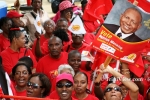By George Alleyne
March 31 2010 – newsday.co.tt
 The surprise hint of an early general election thrown out by Political Leader of the ruling People’s National Movement (PNM), Prime Minister Patrick Manning, at last Sunday’s Special Party Convention, along with the circumstances which may have prompted it, has, oddly enough, provoked the feeling that Manning may be playing with the Opposition.
The surprise hint of an early general election thrown out by Political Leader of the ruling People’s National Movement (PNM), Prime Minister Patrick Manning, at last Sunday’s Special Party Convention, along with the circumstances which may have prompted it, has, oddly enough, provoked the feeling that Manning may be playing with the Opposition.
The next general election is not constitutionally due until 2012. It is not the first time, however, that a Prime Minister and Political Leader of the PNM has hinted at the possibility of an early general election years before it was constitutionally due.
Dr Eric Wiliams, the nation’s first Prime Minister, had done that in 1968, when he had shrewdly given rise to speculation of a major Cabinet reshuffle. The significance of Williams’ strategy lay in the fact that in the United Kingdom, home to the Westminster system, which Trinidad and Tobago has adopted, a major Cabinet reshuffle was usually followed by a general election.
Eventually, as it turned out, not only was there no major Cabinet reshuffle and no early general election, but instead only one Cabinet Minister, then Attorney General, George Armsby Richards, was replaced. Succeeding him was Karl Hudson-Phillips.
The question arises as it must. Why did Manning announce to a largely captive audience at the Chaguaramas Convention Centre that he wanted to “direct the PNM to commence the nomination of candidates’ exercise for a general election with immediate effect”? Is it that he wanted the official Parliamentary Opposition United National Congress (UNC) and the right wing Congress of the People (COP) not only to accelerate plans for “unity”, but with these plans to begin a mad scramble for power sharing and the allocation of seats in the expected general election?
Is Prime Minister Manning hoping that the COP’s leadership would also demand a voice in the Senate through being given a seat, possibly two, in the Upper House, in the run-up to the general election and in the process create a measure of unease in the UNC?
Meanwhile, the Opposition by its pointing out that when Manning called an early general election in 1995, the PNM lost somehow, perhaps inadvertently, conveys the impression that it is not prepared for a general election at this time and would rather have more time to attract more groups and individual electors to its side. Clearly, it would be known that influential elements in the PNM would point out the 1995 discomfiture to Manning.
There is another explanation to Mr Manning’s hint of an early general election. It is that he wanted to rally Party groups to his side in the inevitable battle for leadership of the People’s National Movement with former Cabinet Minister, Dr Keith Rowley. Manning may well appreciate that but for the reluctance of Dr Rowley both to have the party split in two and to have uncomfortable in house minuses exposed to public glare, Dr Rowley could have been Prime Minister today.
There was and is a groundswell of support for Dr Rowley as there was in 1987 for retired judge, Dr Aeneas Wills, who had contested the post of Political Leader with Manning, following on the PNM’s defeat in the December, 1986 General Election. Let us be frank, Patrick Manning is irrelevant to the aspirations of the PNM and the broader people’s constituency of Trinidad and Tobago.
Yet, for Mrs Kamla Persad-Bissessar to win over scores of undecided voters in Trinidad and Tobago she must have the courage to come out publicly against Proportional Representation, the main new constitutional plank of her predecessor, Mr Basdeo Panday. The entire Caribbean has seen what Proportional Representation has done to Guyana. Indeed, the legacy of former Guyana President, Linden Forbes Burnham — Proportional Representation — has hurt Guyana, socially and economically, to such a great extent that even to this day scores have fled to Trinidad, some without the benefit of Immigration procedure, settling, largely, in the sugar belt.
Should Manning, despite the above arguments, opt for the holding of elections later this year, This column’s reading of events suggests that it would not be before October or to put it bluntly after the 2010/2011 Budget Debate. This would have given him time to put certain social and economic measures in place.
This column has offered on more than one occasion that an early general election would be called this year. However, there may be just the possibility that, with Manning having confused both the UNC and the COP, the country may see the Local Government Elections being held instead.
